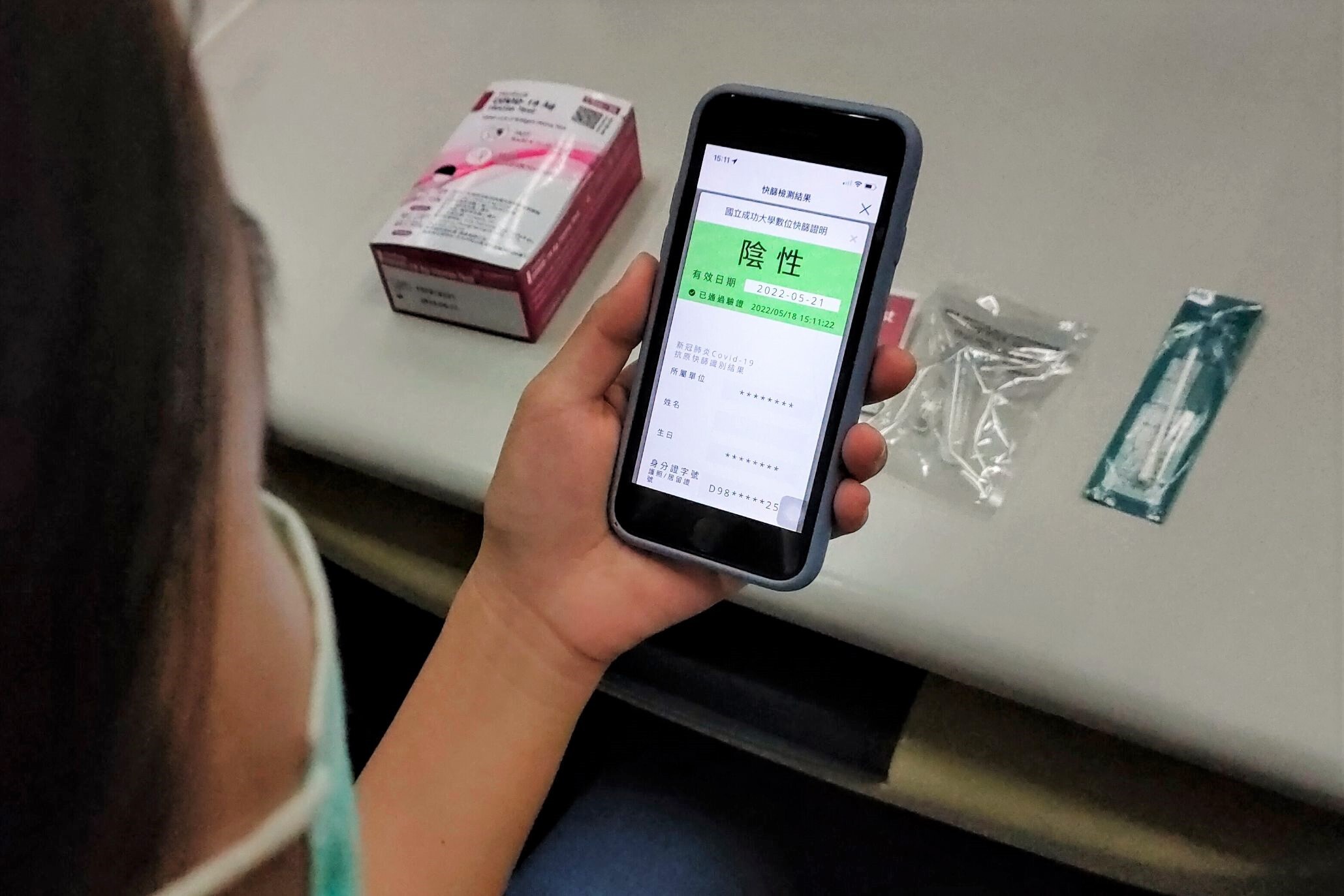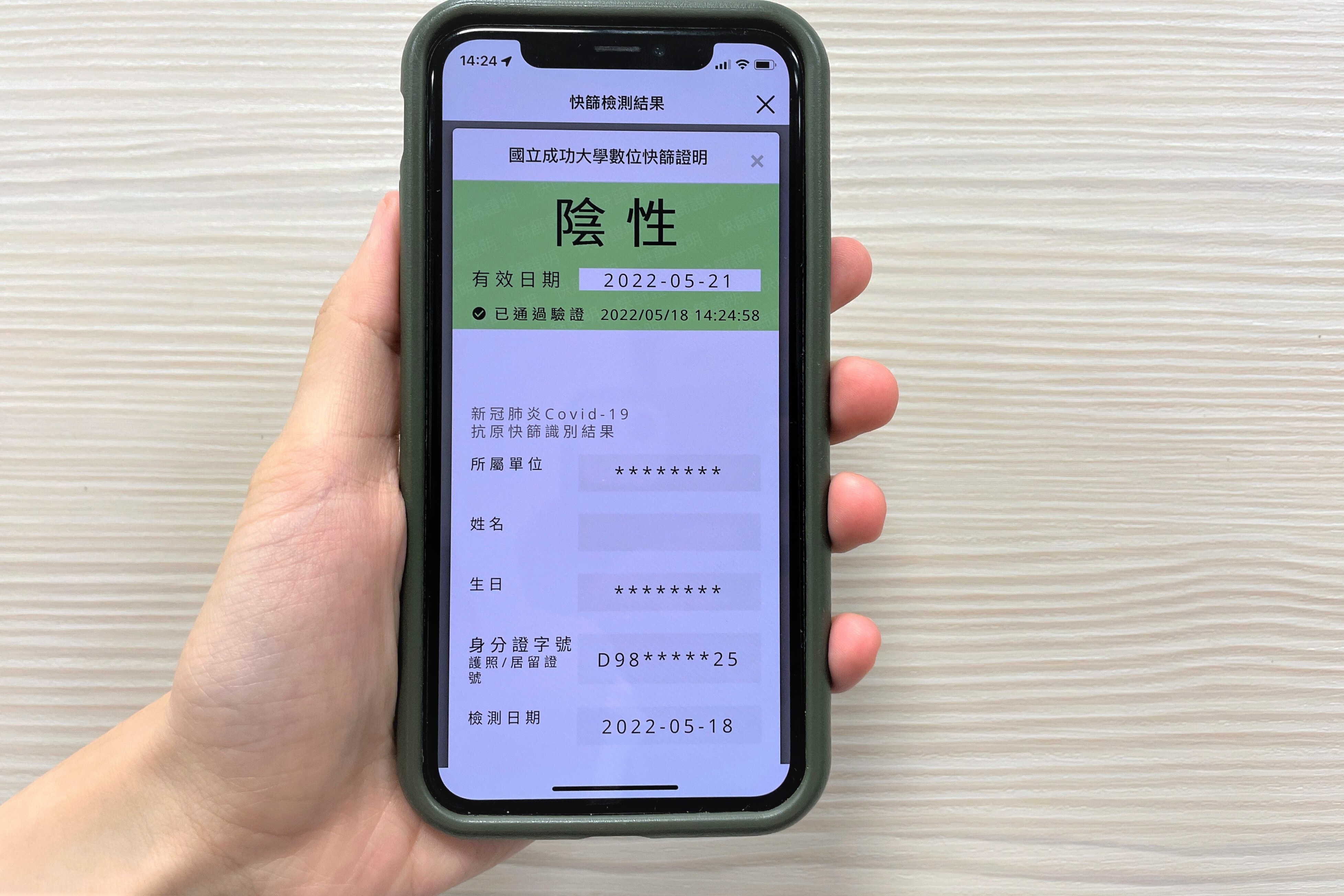NCKU Incorporates AI in Screening Test Result Verification, Constructing a Technological Disease-Prevention Network
Written by Hsu Tsu-Yueh. Image credit to News Center.
Beginning from May 26, individuals whose positive rapid test result is confirmed by a doctor is counted as an official COVID-19 case. National Cheng Kung University keeps true to its courageous promise to combat diseases with technology, and offers practical actions as compassionate care. Enhancing the university’s self-developed mobile phone application, NCKU Announcement Platform (KUAP), the university has added the function of digital certificate of screening test result to the application. This function utilizes Artificial Intelligence in the reading and verification of screening test results. In addition to constructing a technological disease-prevention network within the school, the AI technology could further be connected to the Tainan City’s official LINE account “Tainan Shared Care Cloud”, expanding its service to the public. The automatic reading of test results facilitates more efficient usage medical resources.

After the test result picture is uploaded to KUAP by NCKU personnel, the AI identifies the brand of the testing kit and immediately reads the result. The user will obtain a certificate if the result is negative.
NCKU Center for Research of E-life DIgital Technology (CREDIT) and the MOST-funded Research Center for Epidemic Prevention Science jointly developed the technology of digital certificate of screening test results. NCKU personnel are able to upload pictures of their screening tests, and, via AI, the system will automatically discern between different brands of testing kits and immediately read the results. If the result is confirmed to be negative, the user will obtain a digital certificate. If the result is positive, the automatic reporting system will be activated and the school will assist the person with further testing arrangements.
For citizens who are instructed by the government to conduct self-monitor or home quarantine (either locally monitored or government enforced), they are able to register in the “Tainan Shared Care Cloud” service and upload pictures of their rapid screening test results. Once the AI reads the result and confirms it being positive, the system will automatically schedule a virtual appointment for the patient, cutting down cumbersome processes.
Cases with risks of AI misjudgments will automatically be reexamined by experts. In collaboration with NCKU Department of Nursing, the expert reading team consists of multiple trained professionals to review the accuracy of the testing process, hence lowering the probability of misjudgment. Huey-Jen Jenny Su, President of NCKU, expressed that this NCKU-developed technology not only assists the university’s units to quickly obtain records of confirmed cases, but also allows citizens to accurately and efficiently receive reading results. On the occasion that the picture quality or test result is unclear, the system will immediately report back to the NCKU Hospital for the case to be verified manually.
Kun-Ta Chuang, Director of NCKU CREDIT and Associate Professor of Department of Computer Science and Information Engineering, stated that, previously, the identified potential contacts or home quarantined citizens in Tainan had to be contacted via telephone by the government, which led to the plight of constant busy phonelines, and, as the number of confirmed cases increases, could even delay precious time for reporting. Now, via AI verification of screening test results, the system offers users assistance in reading the test result that gives immediate responses. Not only does this method alleviate people’s mental stress, but it also accelerates the process of arranging virtual appointments and caring services.

This technology not only assists each NCKU unit to quickly obtain records of confirmed cases, but also allows citizens to accurately and efficiently receive reading results.
In 2021, NCKU preceded other universities to have first developed the application KUAP. Combining big data analysis, the system keeps track of the user’s footprints and daily body temperature and symptom records, and conducts assessments of risk of infection. Regarding screening test result tracking, the approach shifts from self-reading and self-report by staffs and students, to manual documentation and notification of each school unit. The system presently includes the function of digital certificate of screening test results. Once the system verifies a positive test result, it will automatically notify the Health Center, Housing Service Division, and other related units such as the associated department, allowing for the school to react promptly.
Kun-Ta Chuang expressed that, to prevent ill-intentioned attempts at tampering with the digital certificate of screening test results, the development team applied different colors in the certificate. In addition, they designed anti-counterfeiting watermark and time stamp, emphasizing that the certificate must be real-time. Once the certificate exceeds its warranted time period, the system automatically displays it as ineffective, which is a measure that further improves the certificate’s credibility.
Provider:
News Center
Date:
2022-06-24




